What are the most commonly used DApps?
DApps, or decentralized apps built on blockchain technology, have evolved into various categories since 2020. Currently, the most popular categorization divides DAPPs into four major categories:
DeFi: the decentralization revolution in finance
DeFi can further be divided into subcategories, including DEX (decentralized exchange), Yield, Lending, Liquid staking, and Bridge for cross-chain functionality.
Inscription: innovation across blockchain limitations
Inscriptions permanently record information such as images and texts on the blockchain, similar to the inscriptions on ancient stone tablets, providing a new way to create native NFTs and token publishers.
NFT Market: a new era of digital item ownership
The NFT market provides a platform for buying and selling digital items such as artworks, Game Props, and collectibles, representing the ownership of specific digital items.
GameFi (Blockchain games): the gaming revolution on blockchain
Blockchain games (GameFi) allows users to enjoy diverse gaming experiences on the chain. The total transaction volume serves as an indicator of project strength, reflecting the total value of asset purchases and consumption by users in the game.
Despite the flourishing ecosystem of DApps, users still face inconvenient searches and frequent encounters with fraudulent links, which greatly increases the cost of searching and security identification. The Discover section on the OKX Web3 platform effectively addresses this issue. We have aggregated mainstream DeFi, blockchain games, and NFT projects from various blockchains, including many niche and cutting-edge projects. Users can directly browse or search to participate, which is not only convenient and fast, but also avoids the risk of entering phishing links through ordinary searches.
OKX Web3 Discover supports more than 70 different public blockchains. You can easily participate by searching for project names.
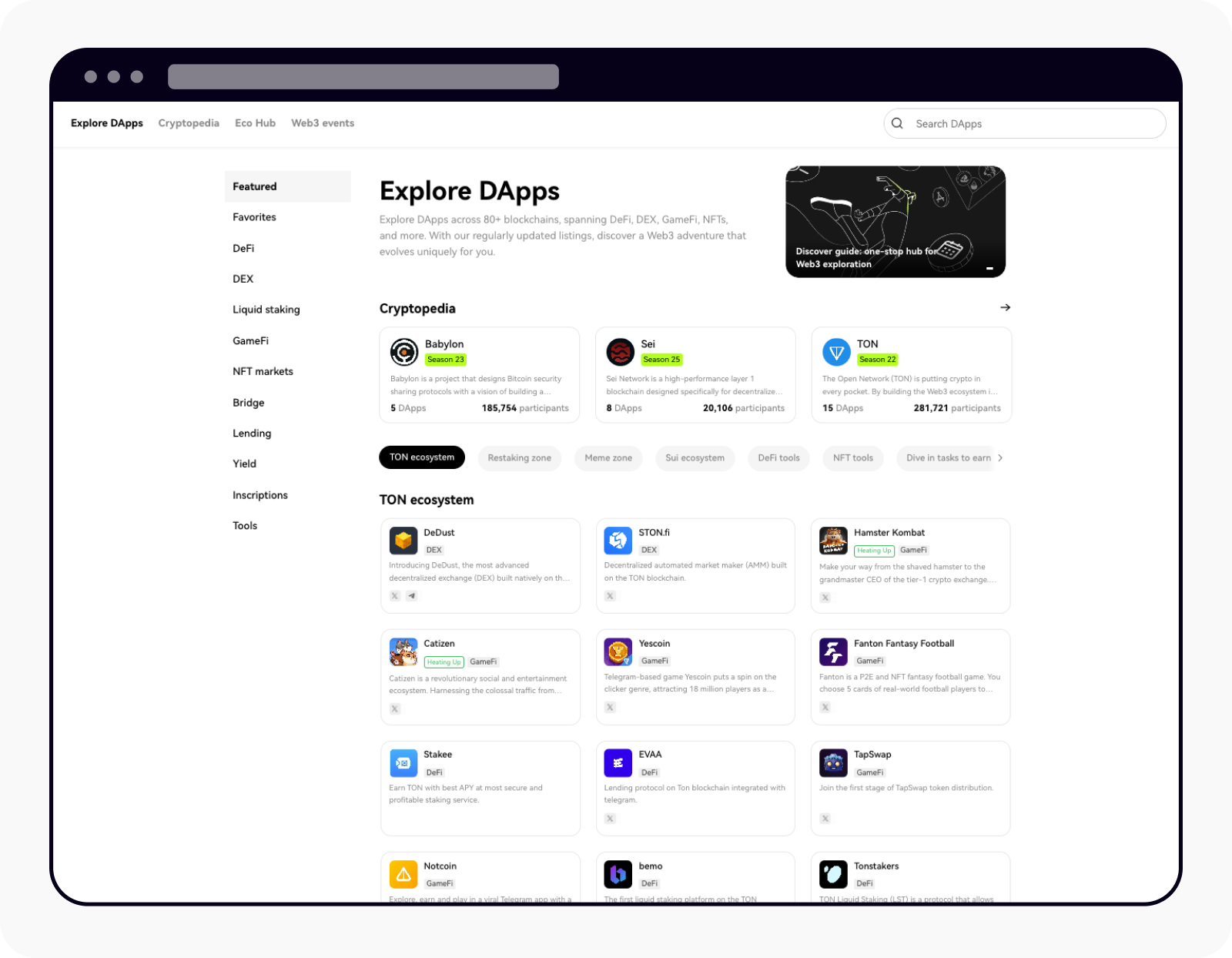
Explore the world of DApps effortlessly on the web
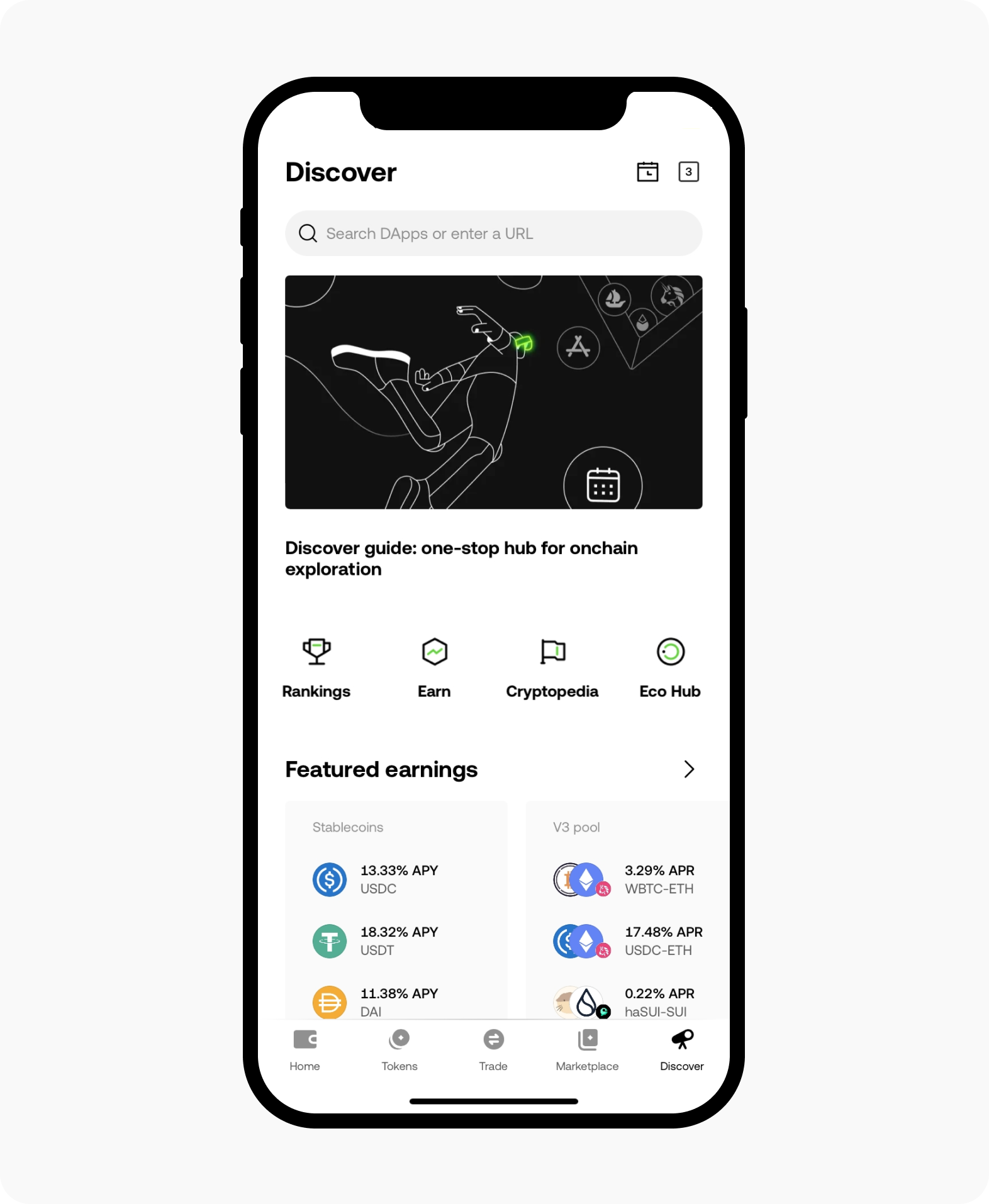
Discover DApps easily via the app
What's DeFi?
DeFi projects redefine the concept of traditional finance by providing services such as asset trading, lending, storage interest, and encrypted asset insurance. Total locked-up volume (TVL) is a key indicator of the strength of DeFi projects, representing the total asset value deposited by users into the project.
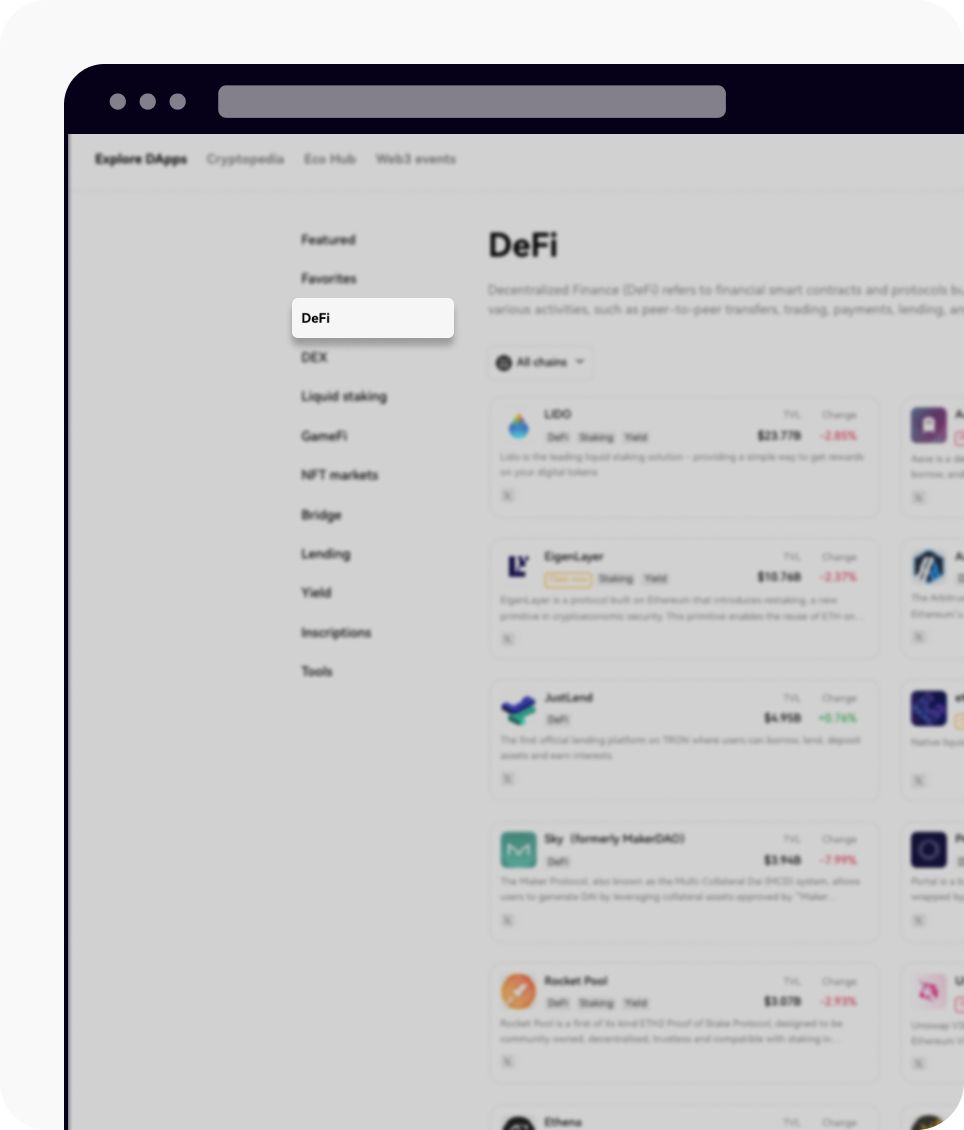
DeFi is ready for selection on the sidebar menu
LIDO:
The leading liquidity pledging solution, currently supporting Ethereum and Polygon pledges.
Uniswap:
A protocol designed for trading and automatically providing liquidity on the Ethereum network.
Aave:
A multi-chain lending protocol that allows users to earn income through deposits, or by depositing collateral to support borrowing other assets.
Curve:
A decentralized flow pool exchange operating on the Ethereum chain.
It's designed for efficient stablecoin trading, emphasizing low slippage, minimal fees, automated exchanges, and seamless access to Compound.
What's Inscription Platform?
Supports inscription trading with good liquidity.
OKX Inscription Trading Market: supports BRC-20 token trading with good liquidity.
UniSat: Chrome plugin wallet for BTC ecosystem, supporting storage and trading of BRC-20 tokens.
Avascriptions: an ASC-20 protocol-based inscription platform with a user-friendly deployment and trading environment.
Etch Market: a leading Ethscriptions platform that offers trading of tokens, NFTs, and domain names.
What's NFT Trading Market?
NFTs, or non-fungible tokens, are unique cryptographic tokens created on the blockchain. They can take the form of images, animations, audio, video, or even short pieces of text. The immense popularity of NFTs has brought significant traffic to the NFT trading market.
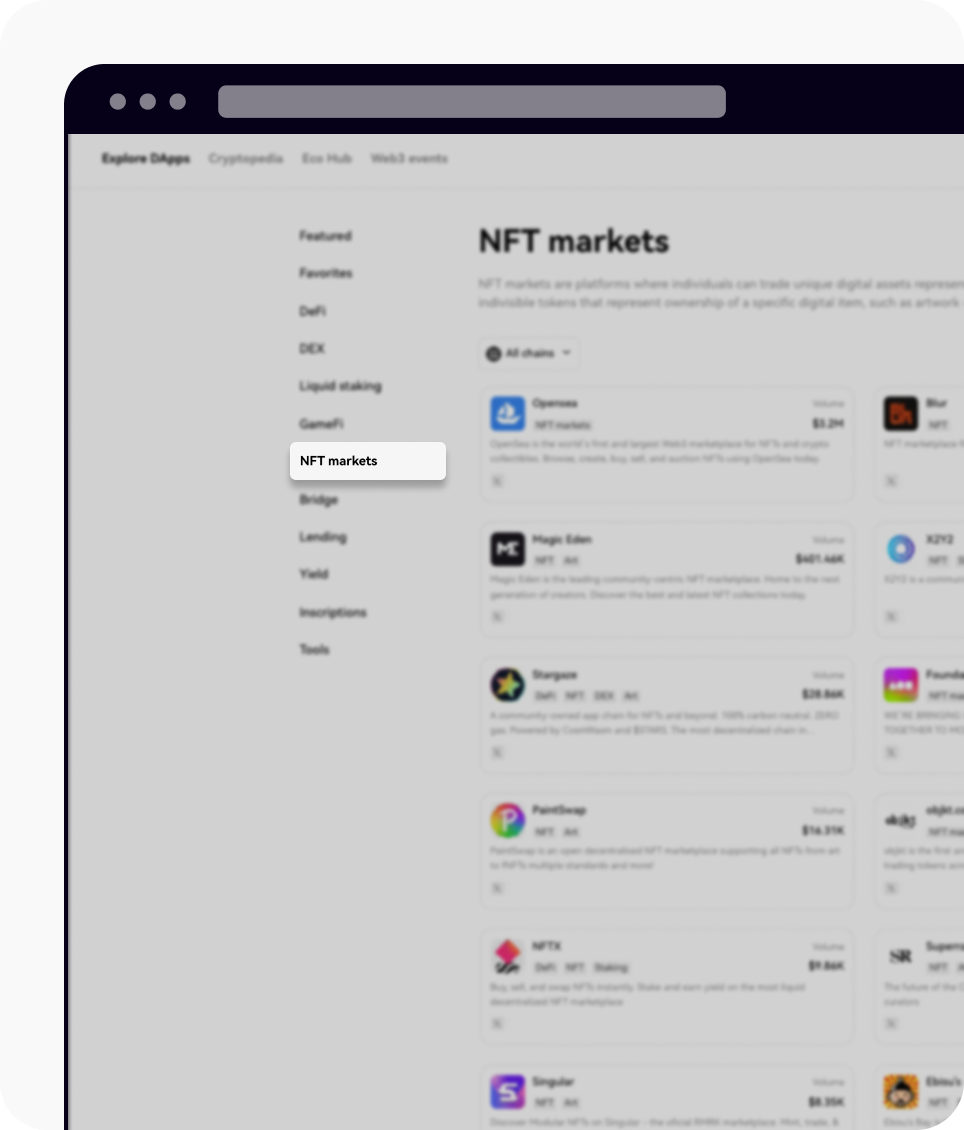
Navigate NFT markets via the Explore Dapps section
OKX NFT Trading Market:
Operating as a decentralized NFT trading market, OKX NFT Trading Market runs across multiple blockchain networks, including Ethereum, OKC, Polygon, BSC, Avalanche C, Immutable X, etc.
It is supported by a large-scale ecosystem, offering clear innate advantages.
Blur:
An NFT market primarily catering to professional traders.
Opensea:
The world's largest comprehensive NFT trading market by total trading volume, supporting the minting, display, trading, and auction of NFTs.
Unisat:
A community-centered Bitcoin NFT trading platform that supports NFT creators to receive royalties.
What's GameFi?
GameFi is the integration of blockchain technology into gaming. The metric used to assess the overall strength of blockchain gaming projects is the Total Transaction Volume, representing the total value of assets purchased and consumed by users within the game.
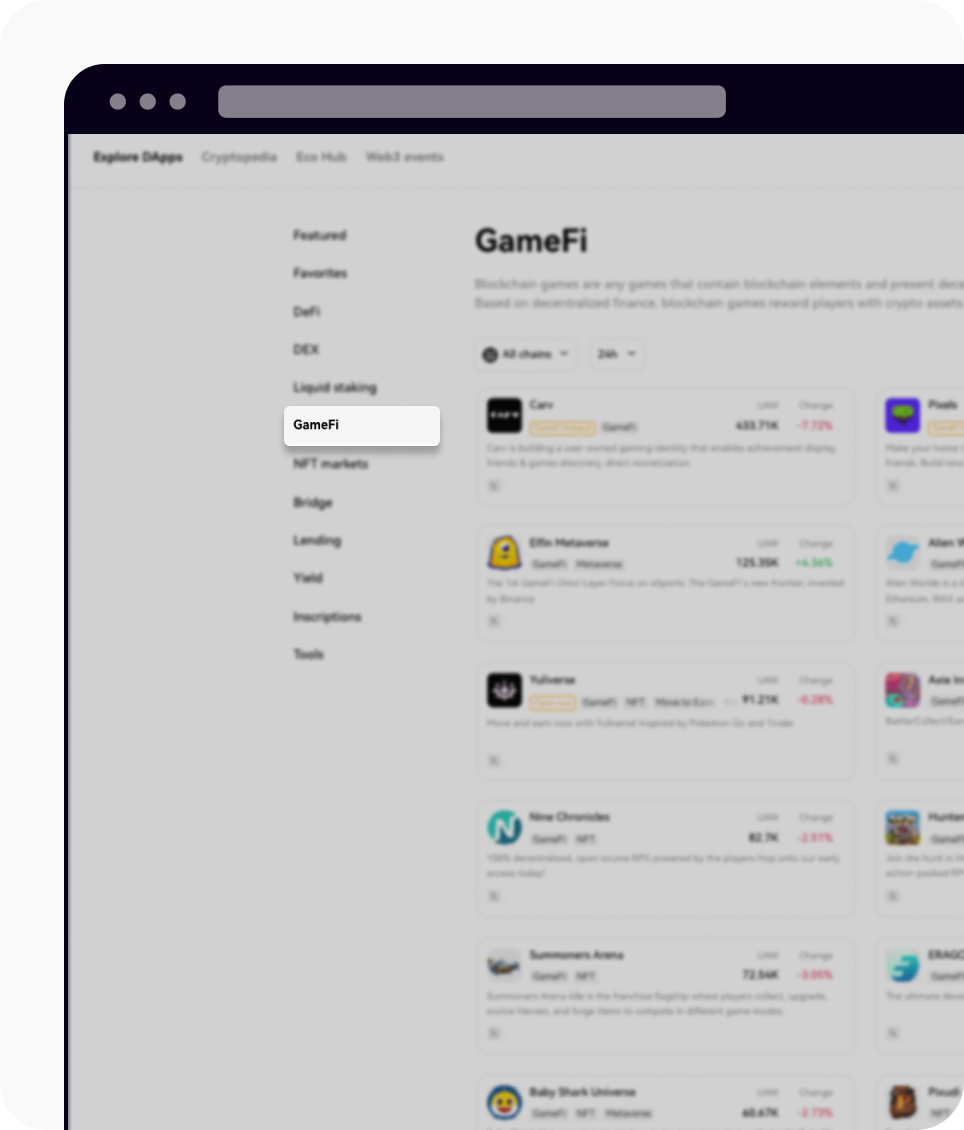
Select GameFi and kickstart your gaming journey on DApp
xPet:
A browser plugin pet game on the Arbitrum chain, earning tokens through production activities.
Hamster Kombat:
A click-through game on TON where players earn in-game tokens by clicking on digital hamsters. The main goal of the game is to manage a virtual cryptocurrency exchange and upgrade various links to increase passive income. Players play as the CEO of the hamster and invest the earned tokens in marketing, licenses, talent, and new products to develop their own exchange.
Catizen:
A super casual cat-raising game in the Telegram ecosystem. The gameplay is relatively simple. Players will play as the owner of a cat cafe and can manage up to 12 cats of different levels at the same time. Every 2 cats of the same level can be combined into higher-level cats, which can generate tokens. As the cat's level increases, the more tokens can be generated per second. Tokens can be used to directly purchase high-level cats in the store to speed up the game progress. In addition to the normal game content, Catizen also incorporates many social referral factors, such as inviting new users to acquire diamonds and exchanging diamonds for cash.
Friend.tech:
It's a decentralized social application based on the Base chain, which combines fan economy and on-chain games. Users can enter a specific room to browse content by purchasing the token "KEY". The increase in the number of purchases by users will push up the price of the key. The transaction fees collected during the buying and selling process are distributed to the platform and homeowners on average.
Currently, our Web3 wallet supports more than 100 chains including Bitcoin, Ethereum, Solana, Fractal Bltcoin, TON, Polygon, Avalanche, Tron, Arbitrum, and many more. When connecting to the wallet, it is automatically recognized without the need for manual chain cutting. The wallet has built-in multi-chain and cross-chain DEX, as well as a heterogeneous multi-chain NFT aggregation trading platform. Through our Web3 wallet, you can also easily access 5000 + DApps, truly realizing a one-stop Web3.0 entrance.
Note: the featured images shown are for reference purposes only. Please refer to the product pages for the actual interface.